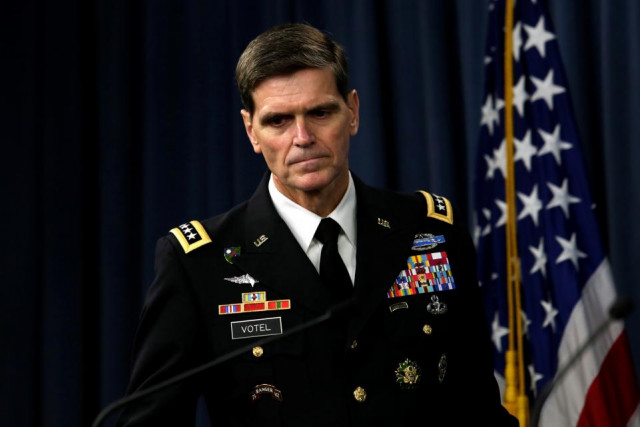Pakistan still central to US Afghan strategy
Troop surge in Afghanistan will increase dependence on Islamabad, say officials

Says India’s public policy to 'diplomatically isolate' Pakistan hinders any prospects for improved relations. PHOTO: AFP/FILE
Given his unpredictable nature and unorthodox approach, there were fears that President Trump might take some drastic foreign policy decisions on Afghanistan as well as on Pakistan.
But contrary to such concerns, indications are that like previous administrations, the Trump government will heavily rely on Pakistan for achieving the elusive goal of peace and stability in neighbouring Afghanistan.
First such hint of Pakistan’s pivotal role was dropped last Thursday by top US commander, who called for troop surge in Afghanistan, a decision if accepted by President Trump would once again bring Islamabad to the forefront.
Indo-Pak conflict could escalate into ‘nuclear exchange': US Centcom commander
Interaction with Pakistan security and Foreign Office officials suggested that Islamabad would welcome any US decision to increase the number of troops in Afghanistan.
The reason for Islamabad’s support stemmed from the fact that prolonged presence of US in Afghanistan means that Pakistan would remain relevant for the Trump administration.
Testifying before the Senate last week, CENTCOM chief General Joseph Votel said military leaders were drawing up a new strategy that would require more American troops in Afghanistan.
While stressing the need for staying engaged with Pakistan, the top general endorsed the assessment of Gen John Nicholson, the head of US mission in Afghanistan that America’s longest war was in a ‘stalemate.’
Since the US pulled out majority of its troops from Afghanistan in 2015-16, groups such as Islamic State have gained significant foothold in the war-torn country.
The primary reason behind the growing presence of Da’ish is the fact that current number of US troops is not sufficient enough to deal with a daunting security challenge.
Islamabad has always opposed precipitating the US withdrawal fearing that such an approach would be detrimental for Afghanistan’s stability. During the transition period, Pakistan believed to have conveyed its concerns on key regional issues including Afghanistan’s situation to the Trump administration.
And one of the major concerns was about Afghanistan’s deteriorating security situation. Pakistan reportedly conveyed to the US about the possibility of Afghanistan slipping into chaos if urgent steps were not taken to mitigate the problem.
Officials said statements from top US generals indicated that Pentagon at least was paying heed to Pakistan’s call on Afghanistan.
“The surge in American troops in Afghanistan means Pakistan will remain critical for the Trump administration,” claimed a senior foreign office official, who requested not to be identified since he was not authorised to speak on the subject.
The official pointed out that CENTCOM chief’s statement had three aspects (a) US needs troops surge in Afghanistan (b) acknowledgement of Pakistan’s critical support and (c) India’s policy of diplomatically isolating Pakistan was troubling.
He said these three factors should not be seen in isolation meaning the Trump administration might persuade India to review its strategy in order to allow Pakistan to focus its energies dealing with more pressing issue of fighting terrorism and working for peace in Afghanistan.
India-Pakistan tensions: US general warns isolation may cause problems
For defence analyst Lt General (retd) Talat Masood the troops surge signals that the US will stay on in Afghanistan.
He said the move also suggested that the US was determined not to allow Afghan Taliban to take over. But at the same it might be a precursor to the dialogue with the Taliban.
“Taliban is a factor in Afghanistan and that factor has to be politically integrated,” Gen Talat stressed.
Pakistan would suffer the most if there is further destabilisation in the neighbouring country. “Therefore, Pakistan should look at the possible troops surge positively,” he added.
Published in The Express Tribune, March 13th, 2017.



















COMMENTS
Comments are moderated and generally will be posted if they are on-topic and not abusive.
For more information, please see our Comments FAQ